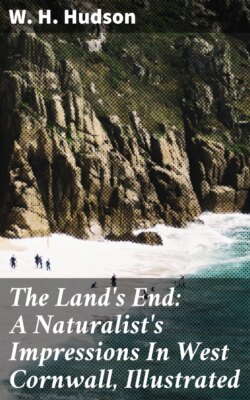Читать книгу The Land's End: A Naturalist's Impressions In West Cornwall, Illustrated - W. H. Hudson - Страница 19
На сайте Литреса книга снята с продажи.
Original
ОглавлениеThe wonder is that with so few leaves it can grow so much wood! The stems, which are not thick, are smooth and of a pale grey colour and grow in and out of the crevices, and cross and recross one another, fitting into all the inequalities of the stony surface and in places where they cover the wall looking like a numerous brood or tangle of grey serpents.
This snaky appearance of the almost leafless old wall-ivy fascinated me, and I went often to look at it on the same spot and was never tired of the sight.
It struck me as curious that the woody ivy should have this aspect, since the wall itself in some parts distinctly suggested the serpentine form and appearance. Here again I was reminded of some of the long earthworks or walls on the Wiltshire and Dorsetshire downs—the rounded, thickly turfed bank which winds serpent-like over the hills and across the valleys, and which often has a green colour differing slightly from that of the earth it lies across.
The old Cornish hedge had this aspect in places where it was clothed with turf, and, viewed from a distance and seen winding about in great curves across the rough brown heath and furze-grown earth, the serpentine appearance was very marked.
Whether or not the Cornish antiquaries have paid any attention to these ancient hedges I do not know. The only native I came across who had anything to say about them was a peasant farmer whose acquaintance I made at his cottage-like farm, a few miles from the hedge I have described. He was a man of seventy-nine but vigorous still and of a lively mind. When I spoke to him about the old hedge and its ancient appearance, he said he had known it all his life; that he was a native of a small hamlet close to the hedge, and at the age of seven, when he first took to birds'-nesting, he used to hunt along it on every summer day and came to know it as well as he knew the fence round his garden and the walls of the cottage he lived in. It had not, he assured me, changed in the least during the last seventy or seventy-two years: it was to-day exactly what it was in his early boyhood, with thick turf and furze and bracken and woody ivy covering it in the same way in the same old places. This made him think it must be very, very old.
It seemed to me that his life, although a long one, was but a short period to measure by in such a case, that if he could have consulted his father and grandfather and his remoter ancestors back to the time when the last Cornish king was cast out by William the Bastard, they would all have given the same testimony and said that the hedge was very old when they knew it.
